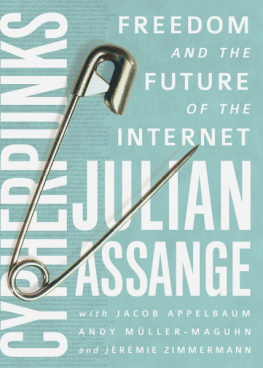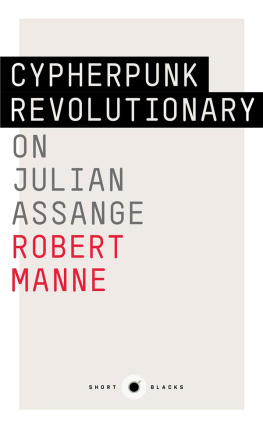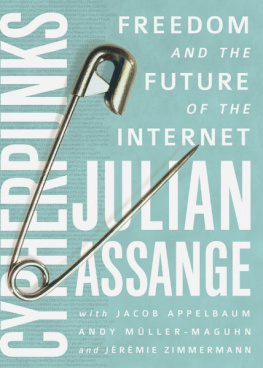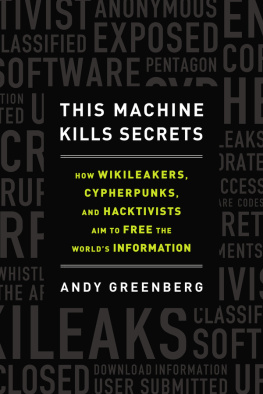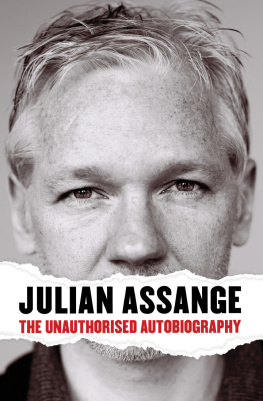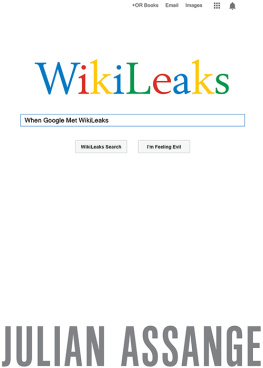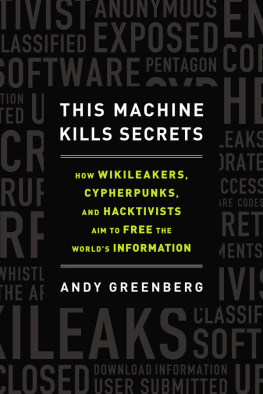

2012 Julian Assange
Published by OR Books, New York and London
Visit our website at www.orbooks.com
First printing 2012
All rights reserved. No part of this book may be reproduced or transmitted in any form or by any means, electronic or mechanical, including photocopy, recording, or any information storage retrieval system, without permission in writing from the publisher, except brief passages for review purposes.
Cataloging-in-Publication data is available from the Library of Congress.
A catalog record for this book is available from the British Library.
ISBN 978-1-939293-00-8 paperback
ISBN 978-1-939293-01-5 e-book
This book is set in the typeface Minion.
Typeset by Lapiz Digital, Chennai, India.
Printed by BookMobile in the United States and CPI Books Ltd in the United Kingdom. The U.S. printed edition of this book comes on Forest Stewardship Council-certified, 30% recycled paper. The printer, BookMobile, is 100% wind-powered.
Released on the Internet by the CypherTeam
WHAT IS A CYPHERPUNK?
Cypherpunks advocate for the use of cryptography and similar methods as ways to achieve societal and political change.
INTRODUCTION: A CALL TO CRYPTOGRAPHIC ARMS
This book is not a manifesto. There is not time for that. This book is a warning.
The world is not sliding, but galloping into a new transnational dystopia. This development has not been properly recognized outside of national security circles. It has been hidden by secrecy, complexity and scale. The internet, our greatest tool of emancipation, has been transformed into the most dangerous facilitator of totalitarianism we have ever seen. The internet is a threat to human civilization.
These transformations have come about silently, because those who know what is going on work in the global surveillance industry and have no incentives to speak out. Left to its own trajectory, within a few years, global civilization will be a postmodern surveillance dystopia, from which escape for all but the most skilled individuals will be impossible. In fact, we may already be there.
While many writers have considered what the internet means for global civilization, they are wrong. They are wrong because they do not have the sense of perspective that direct experience brings. They are wrong because they have never met the enemy.
No description of the world survives first contact with the enemy.
We have met the enemy.
Over the last six years WikiLeaks has had conflicts with nearly every powerful state. We know the new surveillance state from an insiders perspective, because we have plumbed its secrets. We know it from a combatants perspective, because we have had to protect our people, our finances and our sources from it. We know it from a global perspective, because we have people, assets and information in nearly every country. We know it from the perspective of time, because we have been fighting this phenomenon for years and have seen it double and spread, again and again. It is an invasive parasite, growing fat off societies that merge with the internet. It is rolling over the planet, infecting all states and peoples before it.
What is to be done?
Once upon a time in a place that was neither here nor there, we, the constructors and citizens of the young internet discussed the future of our new world.
We saw that the relationships between all people would be mediated by our new world, and that the nature of states, which are defined by how people exchange information, economic value, and force, would also change.
We saw that the merger between existing state structures and the internet created an opening to change the nature of states.
First, recall that states are systems through which coercive force flows. Factions within a state may compete for support, leading to democratic surface phenomena, but the underpinnings of states are the systematic application, and avoidance, of violence. Land ownership, property, rents, dividends, taxation, court fines, censorship, copyrights and trademarks are all enforced by the threatened application of state violence.
Most of the time we are not even aware of how close to violence we are, because we all grant concessions to avoid it. Like sailors smelling the breeze, we rarely contemplate how our surface world is propped up from below by darkness.
In the new space of the internet what would be the mediator of coercive force?
Does it even make sense to ask this question? In this otherworldly space, this seemingly platonic realm of ideas and information flow, could there be a notion of coercive force? A force that could modify historical records, tap phones, separate people, transform complexity into rubble, and erect walls, like an occupying army?
The platonic nature of the internet, ideas and information flows, is debased by its physical origins. Its foundations are fiber optic cable lines stretching across the ocean floors, satellites spinning above our heads, computer servers housed in buildings in cities from New York to Nairobi. Like the soldier who slew Archimedes with a mere sword, so too could an armed militia take control of the peak development of Western civilization, our platonic realm.
The new world of the internet, abstracted from the old world of brute atoms, longed for independence. But states and their friends moved to control our new worldby controlling its physical underpinnings. The state, like an army around an oil well, or a customs agent extracting bribes at the border, would soon learn to leverage its control of physical space to gain control over our platonic realm. It would prevent the independence we had dreamed of, and then, squatting on fiber optic lines and around satellite ground stations, it would go on to mass intercept the information flow of our new worldits very essenceeven as every human, economic, and political relationship embraced it. The state would leech into the veins and arteries of our new societies, gobbling up every relationship expressed or communicated, every web page read, every message sent and every thought googled, and then store this knowledge, billions of interceptions a day, undreamed of power, in vast top secret warehouses, forever. It would go on to mine and mine again this treasure, the collective private intellectual output of humanity, with ever more sophisticated search and pattern finding algorithms, enriching the treasure and maximizing the power imbalance between interceptors and the world of interceptees. And then the state would reflect what it had learned back into the physical world, to start wars, to target drones, to manipulate UN committees and trade deals, and to do favors for its vast connected network of industries, insiders and cronies.
But we discovered something. Our one hope against total domination. A hope that with courage, insight and solidarity we could use to resist. A strange property of the physical universe that we live in.
The universe believes in encryption.
It is easier to encrypt information than it is to decrypt it.
We saw we could use this strange property to create the laws of a new world. To abstract away our new platonic realm from its base underpinnings of satellites, undersea cables and their controllers. To fortify our space behind a cryptographic veil. To create new lands barred to those who control physical reality, because to follow us into them would require infinite resources.
And in this manner to declare independence.
Next page
